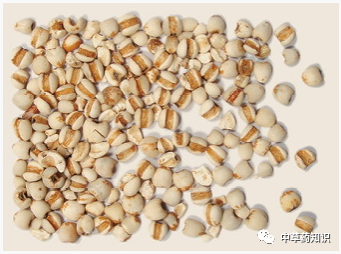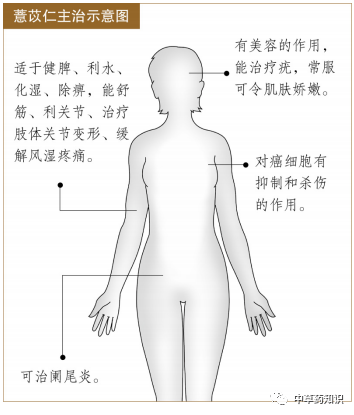The “Shen Nong Ben Cao Jing” states: Coix Seed (Yi Yi Ren), with a sweet flavor and slightly cold nature, is indicated for muscle spasms and rheumatic pain that restricts movement; it can promote the downward movement of Qi. Long-term consumption can make the body feel light and increase vitality. Its root can expel three types of parasites. Coix Seed also known as Jie Li, grows in areas with abundant water and grass, as well as in cultivated fields and wilderness.

【Original Text】Coix Seed (Yi Yi Ren), sweet in flavor, slightly cold. It treats muscle spasms, inability to bend or stretch, rheumatic pain; promotes Qi downward; long-term use benefits the body and increases Qi. Its root expels three types of parasites. Also known as Jie Li. Grows in wetlands and fields.

【Name Explanation】Coix Seed is the mature fruit of Coix, resembling pearls, hence it has many names related to pearls, such as Bodhi Pearl, Gelian Pearl, and Grass Pearl. Coix Seed serves as both a medicine and food, and due to its white color, it is also referred to as Yi Mi, Liu Gu Mi, and Pearl Rice.
The “Ben Cao” states that Coix Seed has a sweet flavor and slightly cold nature, indicated for symptoms of rheumatic arthritis such as muscle spasms and inability to bend or stretch; it can guide dampness downward. Long-term use can tonify the original Qi, making the body light and agile. Additionally, the root of Coix can eliminate various internal parasites.

Coix Seed, being sweet and belonging to the Earth element, is suitable for strengthening the spleen, promoting urination, transforming dampness, and alleviating pain. Its pain-relieving effect is primarily manifested in its ability to relax muscles, benefit joints, treat deformities of limbs and joints, and relieve rheumatic pain; the dampness-transforming effect is also emphasized by ancient practitioners: they believed that dampness invading the body could lead to dampness-related pain, damp accumulation generating heat, and damp-heat resulting in parasites, while Coix Seed can eliminate pain and kill three types of parasites. Coix Seed, being sweet, excels in strengthening the spleen and benefiting the stomach, along with its damp-transforming effects, making it particularly suitable for symptoms of spleen deficiency and diarrhea. Roasting Coix Seed and combining it with Bai Zhu (Atractylodes), Shan Yao (Chinese Yam), Fu Ling (Poria), fried Bian Dou (Hyacinth Bean), and Qian Shi (Euryale Seed) can enhance the effects of strengthening the spleen and eliminating dampness; when there is spleen deficiency with excessive dampness, using both raw and cooked Coix Seed together yields better results. Ancient practitioners found that cooking Coix Seed into porridge can also treat symptoms of diabetes; raw Coix Seed has effects of clearing heat and expelling pus.
Traditional Chinese Medicine believes that Coix Seed belongs to the Earth element, thus it can tonify the spleen; tonifying the spleen benefits the lungs, hence it can treat lung atrophy and lung abscess. If lung conditions are not severe, raw Coix Seed can be combined with Dong Gua Zi (Winter Melon Seed), Tao Ren (Peach Kernel), and Lu Gen (Reed Rhizome) for treatment; if the lung abscess has ruptured, leading to significant pus and blood expectoration, raw Coix Seed can be combined with Jie Geng (Platycodon) and Bai Ji (Bletilla) for treatment. Raw Coix Seed can also treat appendicitis. Using raw Coix Seed with Jin Hua (Honeysuckle), Xuan Shen (Scrophularia), Dang Gui (Angelica), Sheng Di Huang (Rehmannia), Di Yu (Sanguisorba), Gan Cao (Licorice), Huang Qin (Scutellaria), Sheng Da Huang (Rhubarb), and Dan Pi (Moutan) can treat acute appendicitis; when combined with Bai Jiang Cao (Patrinia) and Fu Zi (Aconite), it is suitable for symptoms of suppurative appendicitis, perforation, or abscess formation. Additionally, raw Coix Seed can promote urination; when combined with Che Qian Zi (Plantago Seed), Fu Ling (Poria), Zhu Ling (Polyporus), and Ze Xie (Alisma), it can treat edema and urinary difficulties. Modern medical research has found that the coixenolide in Coix Seed has inhibitory and lethal effects on cancer cells; Coix Seed also has beauty benefits, treating warts (verrucas), and regular consumption can make the skin delicate, safe for pregnant women. Furthermore, Coix Seed is rich in proteins, starch, fats, carbohydrates, and vitamins B, earning it the title of “King of Gramineous Plants in the World.”
【Therapeutic Formulas】 (For reference only)
For rheumatic body pain, worsening in the morning and evening:
Ma Huang (Ephedra) 93g, Xing Ren (Apricot Kernel) 20 pieces, Gan Cao (Licorice), Coix Seed each 31g. Add 4 liters of water and boil down to 2 liters, divided into two doses.
For edema and shortness of breath:
Take Yu Li Ren (Bush Cherry Seed) 93g, grind finely, filter the juice with water, and cook Coix Seed rice, consume twice a day.
For sand and stone heat dysuria, unbearable pain:
Coix Seed, leaves, and roots can all be used; add water to decoct and drink hot (cold in summer), to the extent of urination. For diabetes with thirst:
Take Coix Seed to cook porridge.
For lung atrophy cough with pus and blood:
Take Coix Seed 312g, crush, add 3 liters of water to decoct down to 1 liter, take with a small amount of wine.
For abscesses that do not rupture:
Swallow 1 Coix Seed.
For toothache from cavities:
Coix Seed and Jie Geng in equal parts, grind into powder and apply.
For pediatric hernia:
Roast Coix Seed with eastern wall yellow earth, add water to cook into a paste and take.

Source: Knowledge of Chinese Herbal Medicine

